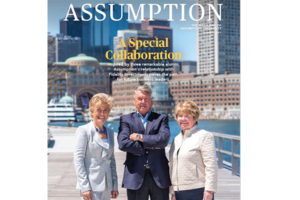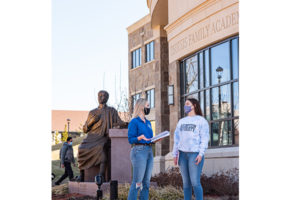
Assumption’s new direct-admission Bachelor of Science in Nursing program prepares compassionate nurses who treat the whole person.
When Caitlin M. Stove, Ph.D., RN, was earning her bachelor’s degree in nursing, “I couldn’t understand why I had to take multiple courses in philosophy and theology or write theoretical papers,” she said.
Her “a-ha” moment came after graduation: While conducting home visits as a nurse for Head Start in Worcester, she discovered how home environments impact the health of children and families. Her liberal arts foundation gave her the ability to better analyze problems, arrive at creative solutions, and communicate with her diverse patient load.
“Health isn’t just about disease,” she said, “but about focusing on the whole person. Once you feel confident as a clinician, you can explore those factors and ask difficult questions that might lead to better health for your patients.”
Now, as the dean of the School of Nursing for Assumption’s new direct-admission Bachelor of Science in Nursing (BSN), she hopes to prepare nursing graduates to understand the various factors impacting health from the beginning of their studies. “Our program will not only deliver much-needed nurses to the workforce, but nurses with a liberal arts foundation steeped in academic excellence, a commitment to service, and ethical healthcare practices. Nurses educated at Assumption will practice solid clinical judgment and stand out as leaders in healthcare who are expert communicators and deep thinkers.”
A History of Nursing Education and a Critical Shortage
Assumption’s new BSN program officially launched in fall 2019, but this isn’t the first time Assumption has educated future nurses. From 1980–95, Assumption offered a flexible, part-time evening program through the Center for Continuing and Professional Education for Registered Nurses (RNs) who wanted to complete their bachelor’s degrees.
Marjorie Tremblay, MSN, RN, who taught in that program and served as its acting chair, is a firm believer that nurses need bachelor’s degrees, “because that academic foundation helps broaden your perspective and gives you a wider understanding of the world around you.”

The push for adding a new direct-admission BSN program to Assumption’s growing number of health science majors came about in large part because the U.S. is facing a critical nursing shortage. Over the next decade, more than 500,000 experienced nurses are expected to retire from the clinical workforce. Meanwhile, the demand for nurses will increase sharply due to an aging population of baby boomers and longer life expectancies, often accompanied by chronic health problems. According to the Bureau of Labor Statistics, jobs for Registered Nurses are expected to grow by 12 percent from 2018 to 2028, much faster than for other occupation.
Preparing for an Increasingly Complex Healthcare System
In particular, there is a booming call for nurses with BSN degrees. Currently, the American Nurses Association is calling for an increase in the proportion of nurses with bachelor’s degrees from 50 to 80 percent. Compelling evidence links a BSN education with lower rates of patient death and medical errors, and better patient outcomes in our complex, high-tech healthcare system.
“The need for nurses will continue to grow, and we understood that we could meet the demand for nurses in a way that’s consistent with our mission and the education we offer,” said President Francesco C. Cesareo, Ph.D.
Having a strong liberal arts background provides Assumption’s nursing graduates with a “well-rounded education,” he noted, “so that they’re not simply trained to do one thing, but have a foundation of knowledge that allows them to ask different kinds of questions, analyze situations effectively, engage in critical thinking, better communicate with patients and family members, and make ethical decisions. Our nursing students will have the ability to go beyond possessing the skills and knowledge of competent nurses to be effective caregivers in the broader sense of the word. I like to remind the nursing students that they will not be treating an illness, but rather a person who happens to have an illness.”
Assumption’s program is unique, he added, in that it reflects “Catholic healthcare and moral and ethical principles. We’re preparing students to respect the dignity of all humans and giving them the framework to think through the moral dilemmas they’ll encounter, helping them navigate through them successfully.”
Both Assumption’s liberal arts foundation and its emphasis on Catholic values led nursing student Alyson Landry ’23 to choose Assumption for her studies after graduating from Bishop Guertin High School in Nashua, NH.
“Having a background in liberal arts helps you develop into a well- rounded person who knows about topics other than science,” she said, noting that her history class this year has helped her improve her skills in analyzing and writing about what she reads. “If I work in a hospital one day and a superior comes to me at the end of my shift, I’ll be able to communicate more effectively and be more confident about documenting my work based on my education at Assumption.”
Landry is also pleased by the new health science facilities Assumption is building on campus. “It’s exciting to lead the way for the students who come after us.”
Jillian Hamblin ’23, who is thinking about becoming a nurse practitioner after she completes her BSN degree, was initially surprised to discover that she would be taking a balance of science and non-science classes during her first year. Now she likes the idea. Her literature class is helping her improve her reading and writing skills, she said, while her class in world music is introducing her to different cultures.
“We’re learning about Indian music right now,” she said. “It might not seem like it has much to do with nursing, but knowing about different musical traditions around the world will help us understand cultural differences when we become nurses.”
Put Simply: Nurses Need to Know More
Dean Stover describes the program structure as being “almost like a two plus two program,” in that students spend the first two years completing core curriculum and biology courses, plus a nursing course in spring of sophomore year, while juniors and seniors primarily focus on taking nursing courses and earning hands-on clinical experience on campus and through internships. Students graduate with a BSN and a minor in biology.
“The liberal arts courses are so foundational to a nursing education that it was important for me to ensure that our students finish those courses first,” she said. “A solid foundation will allow the nursing faculty to do what they do best: build nursing knowledge.”
Why? Put simply, “These days, nurses are expected to know more,” she said. “We’re building our program on how the future of healthcare looks and on the many roles nurses can play.”
By next year, students in both Assumption’s new physician assistant studies and BSN programs will benefit from the institution’s new Health Sciences building next to the library.
“I’m calling it a clinical learning suite,” Stover said, noting that the second floor will house a clinical skills lab, medication administration room, four high-fidelity simulation labs, and state-of-the-art technology, all of which will allow nursing students to learn in an on-campus environ- ment that prepares them to work in hospitals and clinics. “We’re doing everything possible to ensure that Assumption graduates will not only be expert healthcare practitioners, but leaders in their field.


